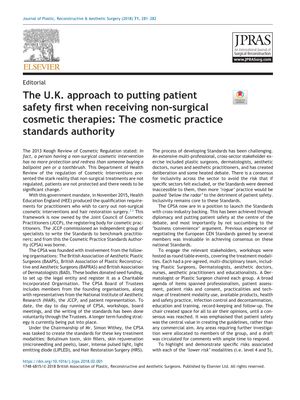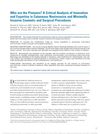The UK Approach to Putting Patient Safety First When Receiving Non-Surgical Cosmetic Therapies: The Cosmetic Practice Standards Authority
February 2018
in “
Journal of Plastic Reconstructive and Aesthetic Surgery
”

TLDR The U.K. created the CPSA to set safety standards for non-surgical cosmetic treatments and improve patient protection.
In response to the 2013 Keogh Review, which highlighted the lack of regulation and patient protection in non-surgical cosmetic interventions, the U.K. established the Cosmetic Practice Standards Authority (CPSA) to improve patient safety. The CPSA, supported by various professional organizations, was founded to create standards for treatments such as Botulinum toxin, skin fillers, skin rejuvenation, laser treatments, and Hair Restoration Surgery (HRS). The development of these standards involved extensive collaboration and debate among stakeholders, emphasizing inclusivity to prevent unregulated 'rogue' practice. The CPSA aims to professionalize the sector by promoting supervision, avoiding lone practice, and establishing networks. Practitioners will be expected to enter data into the JCCP register, which will initially be voluntary but is expected to become mandatory. The introduction of these standards represents a significant change for practitioners, with Plastic Surgeons playing a key role in leading this change and ensuring patient safety. The JCCP Register was set to go live in March 2018.




